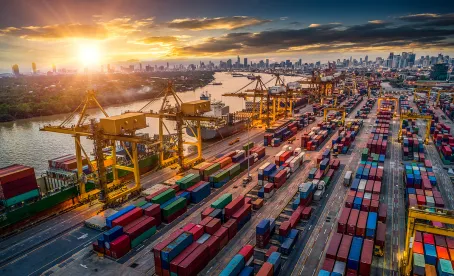On this episode of Bracewell Sidebar, hosts Matthew Nielsen and Phil Bezanson are joined by Matt Bell to discuss US export controls and sanctions. Listen to the podcast below.
Matt is a senior managing director and the global lead of FTI Consulting's export controls, sanctions and trade practice. Prior to joining FTI, Matt spent the majority of his career in senior legal and compliance positions in major multinational companies in the telecommunications and energy industries. He helped companies build best in class compliance programs, often under intense government scrutiny, whether through civil or criminal investigations, or government-mandated audits and monitorships.
What do the terms “export controls” and “sanctions” mean? How are they different?
Export controls is the control of goods, software and technology from a national and international security perspective. Basically we don't want these good software technology getting into the wrong hands. They are based on international regimes, primarily in the United States. There's four international treaties that control different parts of export controls.
Export controls is primarily a multilateral control mechanism — a big distinction from sanctions. Whereas sanctions are more about restricting a country, or an entity or individual, from accessing in the US sense, US capital markets, US business, US products and services, because of a foreign policy reason or a national security reason. For example, we don't like a certain activity or we don't like a certain regime and how they've operated or more frequently, we've seen it applied to human rights violations and we want to disapprove of that behavior with more than just words, a proclamation from Congress or an executive statement that says we don't approve of this. So, we tie financial penalties or financial loss to that from a foreign policy perspective.
Let's talk a little bit about the trends that you are seeing. Obviously, whenever there's a change in administration, there tends to be a change in enforcement priorities, but talk a little bit about what you expect will be coming out of the Biden administration on these issues.
This area of export controls and sanctions and where it was trending under Trump, and where it has gone with Biden, are fairly aligned. This is one area where there wasn't a massive change with the administration. There is still a high, intense focus of all the agencies on the China relationship and what level of technology and products we want China to have. What level of business engagement do we want US business to have? It's just maybe a different nuance in how they've used the tools that their disposal. Trump was very focused on tariffs, and actually making somebody pay more money to bring those products into the country, or pay a financial penalty in that way, whereas Biden has been more about trying to develop a multilateral agreement on what is happening with China and how we're going to approach it.
Let's pivot to maybe the more difficult topic, for those who haven't actually seen it face-to-face. Let's maybe focus on the hypothetical energy company, and how would export controls affect a company that's saying, "Listen, I don't sell anything to North Korea, or Iran, or any bad guys. What do I need to worry about?"
In one of my previous roles, changing that perception was key. I'd go into the trainings and I would just tell people, "Hey, we work here at this energy company, this oil field company. I know most of you think we just work with dumb iron, as they call it in the oil field, and we stick it down a hole, we get oil and gas out and there's no big deal about that. But how many of you think that we sell items that are used in chemical weapons?" Nobody in the room raised their hand. When we started going through some of the chemicals that are used, whether it's in the hydraulic fracturing process or in other processes that the company does that are precursors to sarin gas, or mustard gas, or other things, they started to realize it. The Chemical Weapons Convention has a whole list of chemicals that are restricted for these reasons. We're using it for a very, maybe benign purpose in the oil field sector. But if you take that and mix it with some other things in the right process, you get a very bad chemical weapon. That's why it's controlled.




 />i
/>i

